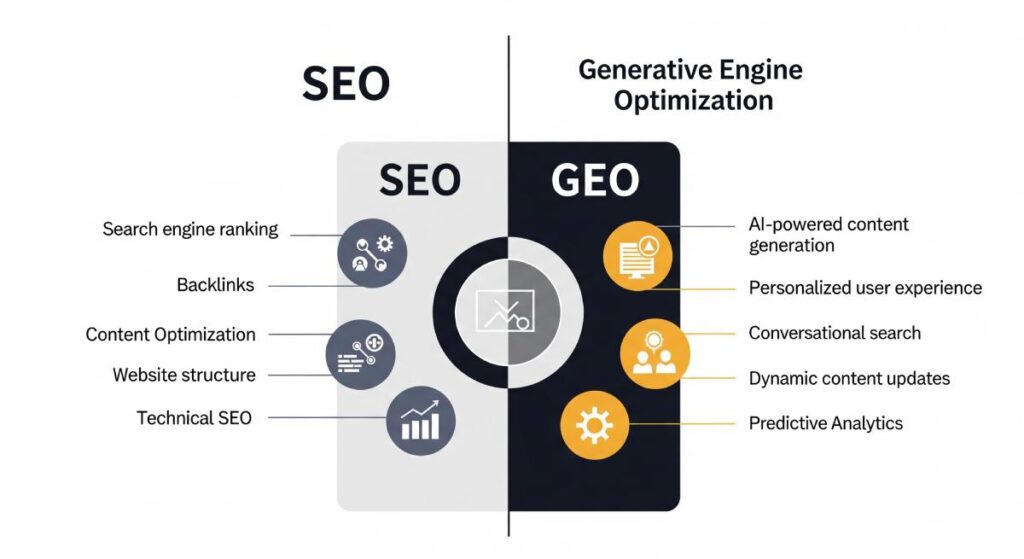![]() The capabilities of the new generative artificial intelligence (AI) tools on the market are remarkable, and one of the first questions many business owners have is how they can use it to their advantage. After all, content often makes up a notable portion of SEO expenses, and good writers can command generous fees.
The capabilities of the new generative artificial intelligence (AI) tools on the market are remarkable, and one of the first questions many business owners have is how they can use it to their advantage. After all, content often makes up a notable portion of SEO expenses, and good writers can command generous fees.
The idea of saving money using a tool to create content may be appealing, but will it have the same effect on SEO as content written by a professional writer? Here’s what you need to know about the impact of AI-generated content on SEO.
SEO Penalties for Using AI to Generate Content
One of the top concerns of anyone with a website considering using AI to generate content is whether search engines can detect and penalize AI-generated content. First, it is important to understand that even the newest AI-detecting tools are not foolproof and often flag human-written content as AI.
Because these tools are far from perfect, search engines do not consider them reliable and do not use them to make ranking decisions. Moreover, Google has clearly stated that its search algorithm does not specifically look for AI-generated content and penalize it.
This means that from a technical standpoint, webmasters might not see any reason to object to its use in generating content. However, Google continues to emphasize high-quality content, and AI output can miss the mark in several aspects.
This means that relying on machines to write content could lead to a big hit in the rankings as it cannot consider all of the qualities that search engines reward the way a human can. Below are some of the weaknesses of AI-generated content from an SEO standpoint.
It Can Result in Duplicate Content
Google may not penalize AI content specifically, but it does penalize duplicate content, and AI tools are prone to creating very similar responses to the same question. With so many creators covering topics that pertain to their business and pursuing the same keywords, the same questions are likely being asked repeatedly.
Giving these tools a prompt that someone else has given them in the past could result in a highly or completely similar post, and search algorithms will categorize this as being unoriginal and will suffer in the rankings accordingly.
It Is Often Inaccurate
 Although AI can provide compelling answers to the questions it is presented with, it tends to make things up. This happens so often that it has been given the term “hallucinations.”
Although AI can provide compelling answers to the questions it is presented with, it tends to make things up. This happens so often that it has been given the term “hallucinations.”
Large language models are not necessarily trained to be accurate. Instead, they are trained to give users the most plausible response to their prompts. Because these tools can only draw from the pool of information they have been trained with, they won’t find the answers to everything.
Therefore, they often fabricate facts, presenting them in a very believable way, even to those with some knowledge of a topic. Therefore, those who insist on using these tools should subject all of their output to thorough and stringent fact-checking.
AI Tools Generate Generic Responses
Another problem with AI output is its tendency to provide generic responses. Because it often simply rewrites common advice that is already on the internet, its content tends to be very broad and rarely delves below the surface.
This means it can hurt SEO performance as Google rewards original content with a unique voice and air of authority or experience. Because it draws on existing content to provide answers, AI cannot come up with fresh ideas the way a human writer can, and it lacks analysis and insight.
Providing people-first content demonstrating the writer’s expertise and experience on a topic is one of the best ways to ensure high rankings in Google.
AI Content Is Less Engaging
 Google’s “Helpful Content” updates reward content that the search engine considers “helpful content written by people, for people.” AI content tends to sound robotic and lacks the human touch seen in content produced by professional writers. Creative content is far more engaging, and readers are more likely to share posts they feel connected to.
Google’s “Helpful Content” updates reward content that the search engine considers “helpful content written by people, for people.” AI content tends to sound robotic and lacks the human touch seen in content produced by professional writers. Creative content is far more engaging, and readers are more likely to share posts they feel connected to.
Pieces written with user intent in mind and connecting with readers on a personal level attract more links and are, therefore, more likely to enjoy higher rankings. AI content that is written with keywords in mind tends to place a greater emphasis on SEO aspects than being informative to readers.
Learn More About Effective SEO Content Marketing Strategies from 321 Web Marketing
AI may be a helpful tool for supplementing research or creating outlines, but it falls short when creating the type of high-quality content rewarded by Google and other search engines. Reaching the top spots in Google requires a careful strategy that combines proper keyword usage with authoritative and engaging content.
To learn more about propelling your site to the top of the results, schedule a consultation with the professionals at 321 Web Marketing.








